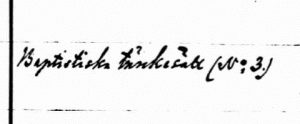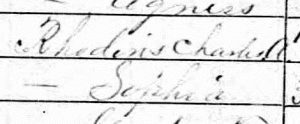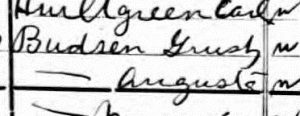My big data project continues at a pace much slower than I’d anticipated. But I’m uncovering so many interesting little nuggets that had escaped my attention before. And of course I go off on tangents as questions come up.
Something kind of funny that has turned up is the many ways you can misspell “Rudeen” (my maiden name). Here are a few:
- Rhodins (1870 Census for Uncle Carl Rudeen):
- Next attempt is Rodein (1875 Census for Uncle Carl Rudeen):
- How about Budsen (1885 census for Gust and Augusta Rudeen):
- Here we have two brothers from the 1918 Saunders County plat book, Lawrence Rodine and Walter Rudenn:
I’m sure I’ll run across more. It just makes it so hard to find records with these kinds of misspellings! Grr!
And now for some mysteries!
That top census record above (1870 for Uncle Carl Rudeen) is from Knox County, Illinois, of all places! Uncle Carl was the first Rudeen to come to America. He left Sweden in 1868 with his wife and two daughters. By 1875 he was in Lancaster County, Nebraska, but until this weekend I wasn’t sure about where he first settled when he came to America.
Well I finally found him in Illinois. He is listed as working for the railroad, which leads me to believe that it was the Central Illinois Railroad that probably recruited him and his family to come to America. More about that another time! But the mystery is Uncle Carl’s next-door neighbor, according to the census: Frank and Agnes “Rhodins”. Assuming they are misspelling the same way as for Carl, this suggests yet another Rudeen family in America. I don’t know of any “Frank” (or Frans, the Swedish equivalent) related to our Rudeen family. More digging needed!
And finally, following up on the news that Augusta’s brothers were probably Free Church members, I think I found another rebel in the family. This little note was next to an entry for Gust Rudeen’s sister, Anna. Anna eventually came to America. Her married name was Anna Bjorklund and she lived in Kansas (I don’t know much about this family).
Anyway, the little note says “baptistiska tänkesätt” which translates as “Baptist mindset“. (I’m not sure what the “No. 3” means.) This notation appears next to Anna’s name in two different instances.

I wonder what she had done, or how she had expressed herself, to earn this notation! I believe Anna marries before she comes to the United States. I’ll have to track her down a little farther in the records and see if there is any further evidence of her “mindset”!
It’s interesting that I’ve come across these instances of young people in this part of Sweden, including Augusta’s two brothers and one of Gusts’s sisters, who are seemingly dissatisfied with the Lutheran Church.




